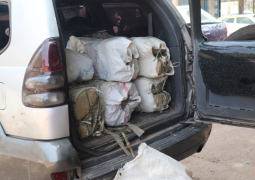
“At this point we are seriously considering closing down our operations this month [May] because we will be left with no means of servicing our clients,” said the pharmacy's founder and CEO Dr Ismaila Badjie in an interview with The Point.
Dr Badjie, who craves the cooperation of the MCA to resolve the issue over its imported drugs, said his “business is on the verge of insolvency with the reduction of revenue on the backdrop of a labour force of 75 employees” who are in the process of starting a furlough sequence.
“Over 1,000 patients are about to be affected by this and it will become a public matter if they do not resolve it,” he added.
In trying to solve the issue, Dr Badjie said he had written to the Chief of Staff at the Office of the President and had met with the Minister for Health to discuss the urgency of releasing the medications held at the airport, which have been denied an import permit.
However, the current acting executive director of Medicines Control Agency, Essa Marenah, who this paper reached out to for his side of the issue, said the imported medical products of Innovarx “are neither registered nor listed as required by law”.
In a letter sent to Dr Badjie on 10 May this year titled: Re: Rejection of Import Clearance Permit, the MCA states: “MCA wish to inform you that after vetting the import clearance permit application submitted, it was found out that all your medicinal products are neither registered nor listed as required by the law.”
Speaking to our reporter at his office on Tuesday (14 May), the acting executive director of MCA, Essa Marenah, said that out of the 290 medicinal products that arrived at the Gambia airport for clearance permit, “205 products were supposed to be registered” before their importation into the country.
“So, these are from countries that don't have stringent regulatory authorities,” he said, adding: “The risk is very high with those types of products; that is, products manufactured from India, China, and other places.
“So, by Gambian law, these products have to be registered, since they are not manufactured from a country that is said to be SRA - SRA means stringent regulatory authority, by WHO standard.”
Mr Marenah said further that when they sorted out the medicines, 85 were manufactured from SRA countries - America and other European countries.
“Now, these 85, by law, are supposed to be listed,” he said.“Listing is a process where you apply, you fill a template that gives all the information about the products, everything, then you submit, and you pay 25 US dollars per product.”
In his reaction to the rejection of his import clearance permit, Dr Badjie also noted that most of their competitors in the market, “including the business partners of the MCA leadership team, often only conduct business with third-tier manufacturing companies from India that are not approved” to sell to the USA.
“Yet, MCA records will show a plethora of registered medications. Furthermore, this precedent of mandatory requirements is only being enforced now by the director of operations at the MCA. Not a single player in the market, including supermarkets, has achieved 100% compliance with listing and registration,” Dr Badjie said.





